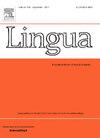How does language shape formation of concepts? Empirical investigation of generics and conditionals in French
IF 1.3
3区 文学
0 LANGUAGE & LINGUISTICS
引用次数: 0
Abstract
This study explores how language influences concept formation, specifically how linguistic expressions signal what is central or essential to forming concepts of kinds. Prior research on preschool children suggests that generics (e.g., “Birds fly”) create strong associations between a kind and its properties, signaling essential features. To gain a deeper understanding of how language influences concept formation and its developmental trajectory, we examined two linguistic expressions—generics and conditionals—and compared them to a third type: demonstrative sentences, i.e., sentences with the pronoun this (e.g., “This bird flies”). We hypothesize that, beyond generics, conditionals may also act as a cue indicating that certain information is essential in concept formation. Three French-speaking groups—late adolescents, young adults, and adults—participated in an elicitation task. While Experiment 3 (adults) confirmed the importance of both generics and conditionals in concept formation, Experiments 1 and 2 (late adolescents and young adults) found no significant differences between the linguistic expressions. These results indicate that conditionals, generics, and demonstratives influence the conceptualization of kinds in a comparable way in late adolescents and young adults whereas at adulthood conditionals and generics are strongest cues for considering a given property as essential to a kind.
语言如何塑造概念的形成?法语泛型句和条件句的实证研究
本研究探讨了语言如何影响概念的形成,特别是语言表达如何表明什么是形成各种概念的中心或必要因素。先前对学龄前儿童的研究表明,仿制药(例如,“鸟会飞”)在一种和它的属性之间建立了强烈的联系,表明了基本特征。为了更深入地了解语言如何影响概念的形成及其发展轨迹,我们研究了两种语言表达——泛型和条件句,并将它们与第三种类型的指示句进行了比较:指示句,即带有代词this的句子(例如,“this bird flies”)。我们假设,除了泛型,条件句也可以作为提示,表明某些信息在概念形成中是必不可少的。三个讲法语的小组——晚期青少年、年轻人和成年人——参加了一个启发任务。实验3(成人)证实了泛型句和条件句在概念形成中的重要性,而实验1和实验2(青少年晚期和年轻人)没有发现语言表达之间的显著差异。这些结果表明,条件句、泛型句和指示句以类似的方式影响青少年晚期和年轻人对种类的概念化,而在成年期,条件句和泛型句是将给定属性视为一种必不可少的最强线索。
本文章由计算机程序翻译,如有差异,请以英文原文为准。
求助全文
约1分钟内获得全文
求助全文
来源期刊

Lingua
Multiple-
CiteScore
2.50
自引率
9.10%
发文量
93
审稿时长
24 weeks
期刊介绍:
Lingua publishes papers of any length, if justified, as well as review articles surveying developments in the various fields of linguistics, and occasional discussions. A considerable number of pages in each issue are devoted to critical book reviews. Lingua also publishes Lingua Franca articles consisting of provocative exchanges expressing strong opinions on central topics in linguistics; The Decade In articles which are educational articles offering the nonspecialist linguist an overview of a given area of study; and Taking up the Gauntlet special issues composed of a set number of papers examining one set of data and exploring whose theory offers the most insight with a minimal set of assumptions and a maximum of arguments.
 求助内容:
求助内容: 应助结果提醒方式:
应助结果提醒方式:


